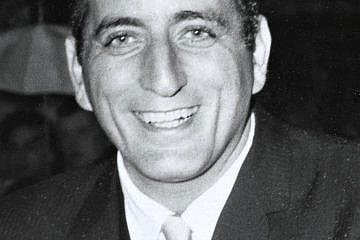“I just like to make people feel good when I perform,” said the New York native, who was influenced by entertainer Bob Hope.
(JNS)
One of America’s musical legends passed away on July 21 in New York, his hometown, two weeks before he would have turned 97 years old.
Born Anthony Dominick Benedetto in 1926, Tony Bennett had a career that spanned seven decades, producing more than 70 albums and 19 winning Grammy Awards. He described his memorable voice styling as “a tenor who sings like a baritone” and left a strong impression on musicians across generations.
In 1965, Frank Sinatra said, “Tony Bennett is the best singer in the business. He excites me when I watch him. He moves me. He’s the singer who gets across what the composer has in mind and probably a little more.”
In 2021, Lady Gaga joined Bennett in duets on his final album, “Love for Sale.” The innovative pop star said at the time following their collaboration that she agreed with Sinatra—“I don’t think Frank lied”—and that her “time with Tony has changed me forever.”
Before Bennett started his music career, he served in the U.S. Army, fighting the Nazis in Germany during World War II.
His final mission as a soldier would be to help liberate the Dachau concentration camp. He described giving food and water to the prisoners they freed—people who “had been brutalized for so long, they couldn’t believe that we were there to help them and not to kill them.”
During his military service, Bennett saw a USO show that dramatically shaped the rest of his life. Comedian Bob Hope performed, and Bennett was so taken by the entertainer’s effect on the troops that he would later say: “He became a big part of the reason I went into show business because at that moment he made me realize that the greatest gift you can give anyone is a laugh or a song.”
After the war, it would be Hope who would come up with the “Tony Bennett” stage name.
Bennett described his musical philosophy as simple and straightforward: “I enjoy entertaining the audience, making them forget their problems.” He continued to entertain audiences well into his 90s.
He noted that people “are touched if they hear something that’s sincere and honest, and maybe has a little sense of humor.” What it came down to, he said, was “I just like to make people feel good when I perform.”
He is survived by his third wife, Susan Crow Benedetto; in addition to two sons and two daughters from his former marriages.
Image: Tony Bennett. Credit: City of Boston Archives from West Roxbury, Mass., via Wikimedia Commons.


